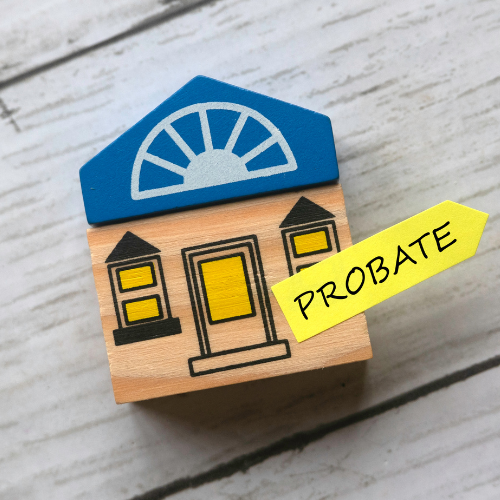When a loved one passes away, dealing with the intricacies of the resulting estate can be an emotional and complex process. One aspect of estate administration that often arises is the sale of real estate property that is part of the Decedent's (called, “the Decedent”) assets. This process can be challenging, but understanding the steps involved can help streamline the process and ensure a smoother transition. In this guide, I'll delve into the world of selling real estate out of probate, offering insights and tips to help you navigate this journey, which can feel overwhelming but doesn’t have to be.
Understanding Probate and Its Role in Real Estate Sales
Probate is the legal process that takes place after a person passes away, during which their estate (i.e., their assets) is settled and distributed according to their will or the state's laws if no will exists. Real estate that is part of the Decedent's assets falls under the purview of probate. However, before attempting to sell real estate out of probate, it's crucial to understand the distinct steps involved:
- Initiating the Probate Process: If the Decedent left a will, the designated executor or personal representative (appointed by the court if no will exists) begins the probate process. This involves filing a petition with the probate court to confirm the validity of the will and appoint the executor. The executor is responsible for managing the Decedent's estate, including real estate.
- Property Valuation: As part of the probate process, the value of the real estate property must be determined. A professional appraiser may be engaged to assess the property's market value accurately.
- Notification of Heirs and Beneficiaries: The court requires that all heirs and beneficiaries be notified of the probate proceedings, including the intent to sell real estate. This is to ensure that everyone involved is aware of the process and has the opportunity to contest any issues.
- Obtaining Court Approval: Before proceeding with the sale, the executor must obtain court approval. This often involves presenting a detailed plan for the sale, including the marketing strategy and listing price. The court's role is to ensure that the sale is in the best interest of the estate and its beneficiaries.
- Marketing and Sale: Once court approval is obtained, the property can be marketed and sold. It's essential to work with real estate professionals experienced in probate sales to ensure compliance with legal requirements and maximize the property's exposure to potential buyers.
- Sales Proceeds Distribution: After the sale is completed, the proceeds from the real estate transaction become part of the estate's assets. These funds are then distributed according to the will's instructions or the state's laws, taking into account any debts or taxes owed by the estate.
Tips for a Smooth Probate Real Estate Sale
Navigating the probate process can be intricate, but these tips can help streamline the sale of real estate out of probate:
- Engage Professionals: Probate laws vary by jurisdiction, and the legal and financial complexities can be daunting. Hiring a probate attorney experienced in real estate matters and working with a seasoned real estate agent can significantly simplify the process.
- Accurate Property Valuation: Determining the property's market value is crucial for both court approval and attracting potential buyers. An appraiser can provide an unbiased valuation that forms the basis for the listing price.
- Proper Documentation: Ensure all required documentation is complete and accurate. This includes court documents, property titles, wills, and any other paperwork necessary for the sale.
- Transparency: Keep beneficiaries and heirs informed throughout the process. Open communication can prevent disputes and potential legal challenges later on.
- Marketing Strategy: Craft a comprehensive marketing strategy to attract potential buyers to the property. Consider staging the property and using both online and traditional marketing methods to maximize exposure.
- Court Approval Plan: Present a detailed plan to the court for the real estate sale. This should outline the property's value, proposed listing price, marketing strategy, and potential timeline for the sale.
- Maintenance and Upkeep: While the property is on the market, ensure it remains well-maintained. A property in good condition is more likely to attract buyers and fetch a fair price.
- Transparent Accounting: Keep meticulous records of all financial transactions related to the sale, including expenses incurred during the process. This transparency can help prevent accusations of mishandling estate funds.
- Consider Beneficiaries' Interests: While aiming for a swift sale is important, it's equally vital to prioritize the beneficiaries' interests. This may involve taking their opinions into account and ensuring that their needs are met during the process.
- Legal Compliance: Every jurisdiction has specific probate and real estate laws that must be adhered to. Working with professionals familiar with these regulations can help you avoid legal pitfalls.
Selling real estate out of probate can be a complex process, requiring a delicate balance of legal knowledge, financial acumen, and empathy for the beneficiaries involved. By understanding the steps involved, engaging experienced professionals, and prioritizing transparent communication, you can navigate the intricacies of probate and ensure a smoother real estate sale. While challenges may arise, a well-executed probate property sale can bring closure to a difficult chapter and provide beneficiaries with the resources they need to move forward.
Should you find yourself involved in a situation that involves selling real estate out of probate, Mockingbird Title and Attorney Houston Akin would love to serve as your experienced professionals, both in probating the estate and in performing the title work before closing. Let us know if we can help.
